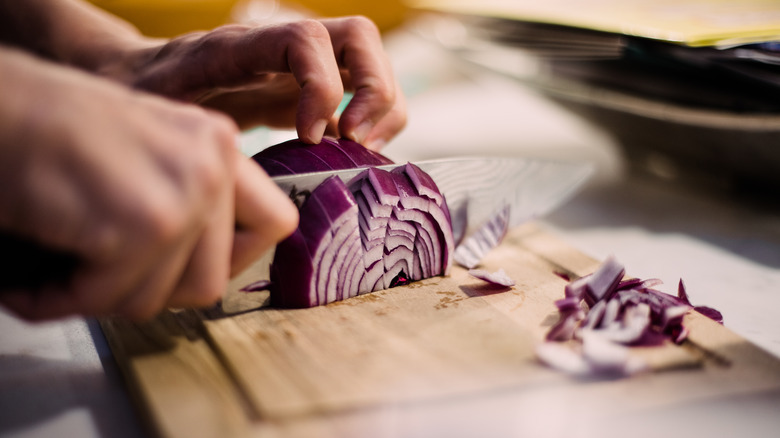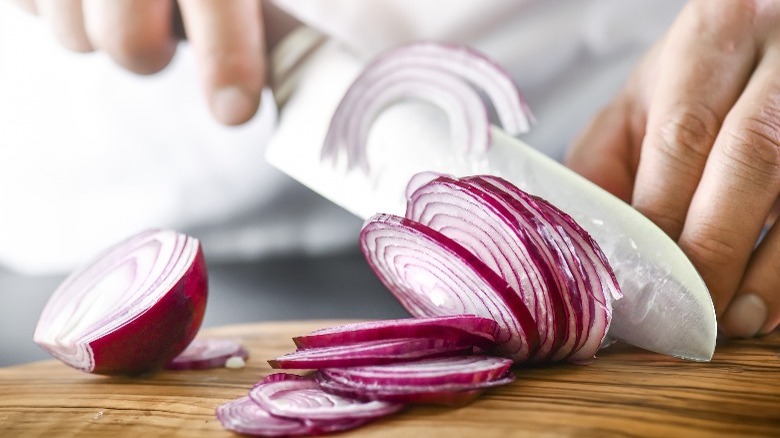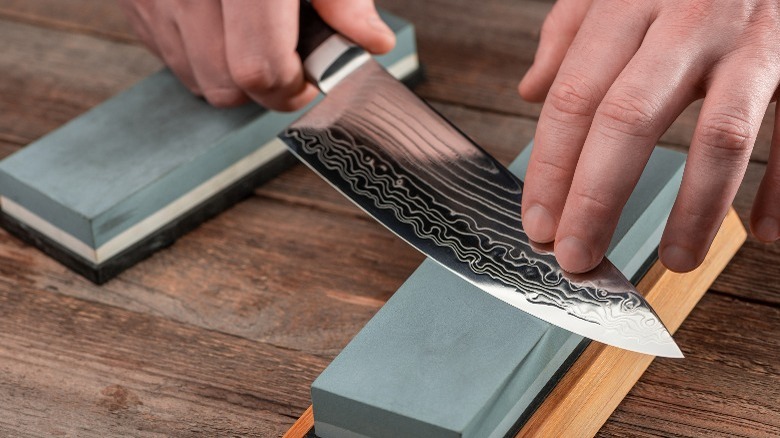The Knife Upgrade You Need To Prevent Onion-Induced Tears
We've all been there. One minute you're in the kitchen chopping onions to make a classic dish like French onion soup, the next you're weeping as if someone just insulted your meal. It seems like an inevitable part of the cooking process, but there's actually a way to reduce those waterfalls. A less emotional onion-dicing experience can easily be achieved through proper knife maintenance. It turns out that the duller the knife, the wetter the tears, so diligent sharpening should keep your face dry and your eyes sting-free.
If you're ever doubtful about the state of your knife's edge but you don't feel like testing out the blade on your sensitive, fleshy finger, you can always hold a sheet of paper up and slice down. If you can't evenly cut down the middle without force, you probably need a good sharpening session. In fact, paper isn't even completely necessary. If you encounter any sort of pushback when chopping an onion, evident by a squishy sound as the blade runs through or a loud twang as it hits the cutting board, stop what you're doing and invest some time in honing your sword using a whetstone (also called a "sharpening stone" if you want to be less medieval about it) or a mechanical knife sharpener.
Why do onions make you cry?
All that noise your onion makes when you pass a dull knife through it is actually the vegetable releasing its natural chemicals. The reaction is what causes the stinging sensation, part of a defense system to ward off those looking to grab a bite in the wild. Onion cells are filled with an enzyme called alliinase, so when anything breaks through the inside, they pop like microscopic water balloons. The enzymes react with the onion's amino acids to create sulfenic acids, referencing the sulfur-heavy compounds that give the onion its distinct odor and taste (it's also why less sulfur-heavy varieties like sweet onions don't cause as much irritation, per Britannica).
These sulfenic acids are highly unstable and, with the help of an additional enzyme known as lachrymatory factor synthase (LFS), their makeup quickly morphs into another compound called lachrymatory factor (LF). The latter, which manifests as the invisible gas syn-Propanethial-S-oxide released into the air, is what ultimately bothers the tear ducts, more scientifically labeled the lacrimal glands. The waterworks are actually the body's natural way of trying to flush out the invading substance responsible for the nerve irritation.
Battle of the blades: sharp vs. dull
Chilling the onions in the fridge or freezer before chopping them stabilizes their enzymes a bit, while running them under water or chopping them in an outdoor space will keep the gases away from your eyes, but these methods are way less convenient than simply sharpening your knife. A sharp knife that glides more easily through the onion avoids damaging the interior cells, thereby releasing less alliinase enzymes, according to a study from McGill University. In contrast, the increased surface area of a dull knife mangles the onion and bursts open more of its cells, causing a bigger chemical reaction. There's also more of a chance of losing your grip while you struggle to pierce through the onion, increasing the chances of cutting yourself.
A combination of sharpening and honing can make your kitchen blade last longer and cut more effectively. Whetstones can shave metal off of a knife in order to sharpen the material, while a rod-like honing steel will straighten an edge that becomes bent out of shape during use. In fact, you'll often find that knives that feel dull may merely require honing, which should be a more common chore than sharpening. Forming both of these habits will not only result in less teary onion encounters, but also a faster and safer trip to the chopping block in general.



